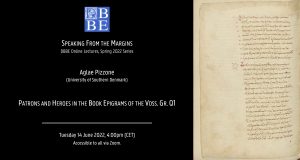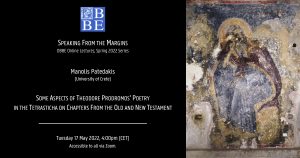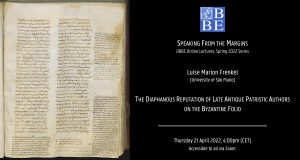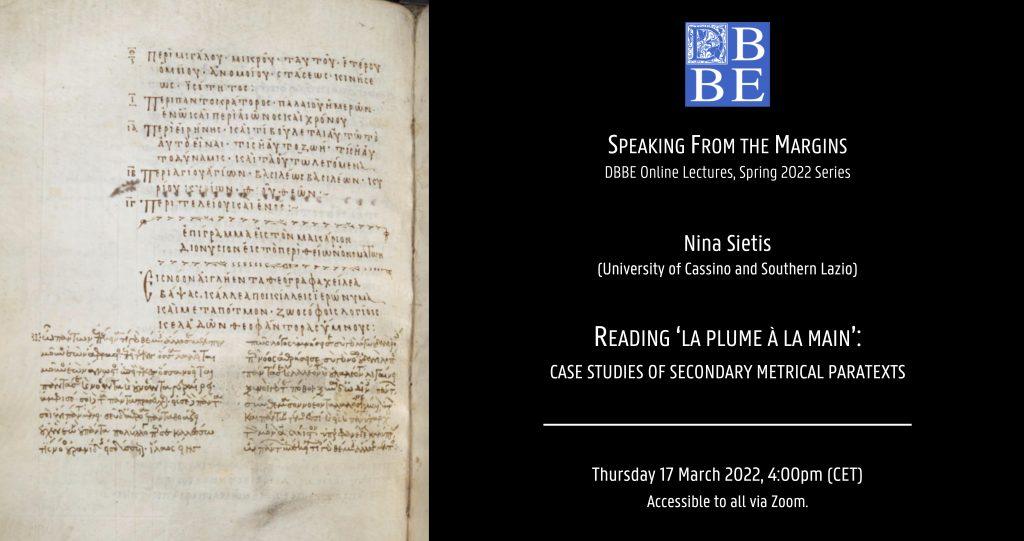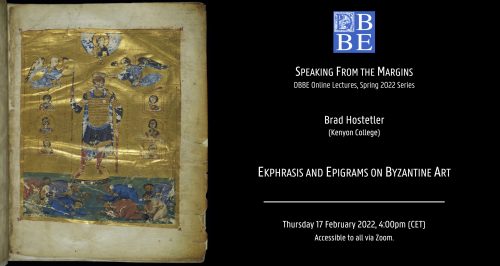The third lecture in the online lecture series Speaking From the Margins. DBBE Online Lectures, Spring 2021 Series will be given by Jacopo Marcon (University of Birmingham).
In 2018, Jacopo Marcon obtained his MA in Classical Philology cum laude, at the University of Udine, with a thesis in Latin Palaeography (the catalogue of medieval manuscripts of Giusto Fontanini, from the Biblioteca Guarneriana in San Daniele del Friuli). Currently, he is a third-year PhD student at the department of Theology and Religion of the University of Birmingham. He is part of the ERC Project: CATENA: Commentary Manuscripts in the History and Transmission of the New Testament and is currently working on the first-ever critical edition of the Ps. Oecumenian Catena on the Romans (title of the thesis: The Edition of the Ps. Oecumenian Catena on Romans).
Abstract
This presentation aims to investigate the use of epigrams in the Byzantine New Testament Catenae, with a particular focus on the so-called Ps. Oecumenian Catenae on the Pauline Letters. I will analyze the position, the structure, the content, and the function of the byzantine book epigrams to reveal new interesting features in the history of Catenae and commentaries on Paul.
First, I will generally introduce the New Testament Catenae. These are biblical manuscripts with the text of the New Testament alongside the exegetical chain of comments made up of multiple extracts from the Greek Church Fathers. Second, I will consider the so-called paratextual features of the biblical Catenae on the Pauline Epistles, where most of the book epigrams are present (the Euthalian Apparatus and the set of prefaces and subscriptions).
In doing so, I will investigate different types of book epigrams. For the first typology, that of the so-called text- or author-related epigrams, I will examine the cases of Paris, BnF, Gr. 219 (GA 91), 224 (GA 1934), and Coisl. 217 (GA 1972) and Venice, BNM, Gr. Z 34 (coll. 349) (GA 1924). In these manuscripts, alongside the text of the preface on the Pauline epistles in verses (ἡ τῶν ἐπιστολῶν ὑπόθεσις διὰ ἰάμβων), short book epigrams open the text of each of the Epistles.
In some other manuscripts, book epigrams (the so-called image-related epigrams) accompany miniatures of the apostle Paul, and the Greek Church Fathers, such as in the manuscripts Paris, BnF, Gr. 223 (GA 1933), and Gr. 224 (GA 1934)), or can be incorporated into the text of the colophons and notes of property (i.e. the scribe-related epigram in Vatican City, BAV, Bar. Gr. 503 (GA 1952), with the subscription of John Pepagomenos, or the patron-related epigram at the end of Athos, Mone Agiou Paulou 2 (GA 1862), regarding a βασιλισσα Μαρια).
Finally, my presentation explores the content and the textual tradition of some epigrams that have been overlooked, in Paris, BnF, Gr. 237 (GA 82), including one which seems to have been written in Arabic or Turkish but with Greek letters.
Practical information
Date & time: Tuesday 30 March 2021, 4:00pm (UTC+2, CET)
No registration required. The lecture is freely accessible via Zoom: https://ugent-be.zoom.us/j/95155014627?pwd=NjVXWmVQeXl5MzVUWFVjSVpLUUYvQT09
- Meeting ID: 951 5501 4627
- Passcode: 57b2RkxU
